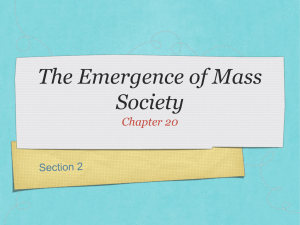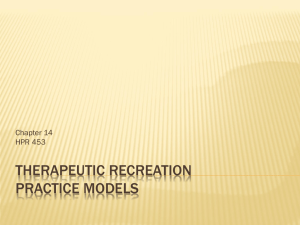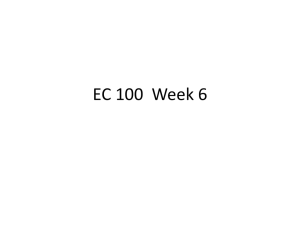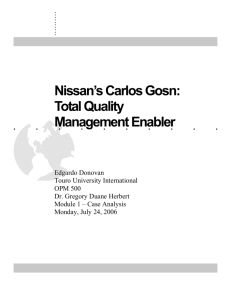Unit 2 – Work and Leisure
advertisement
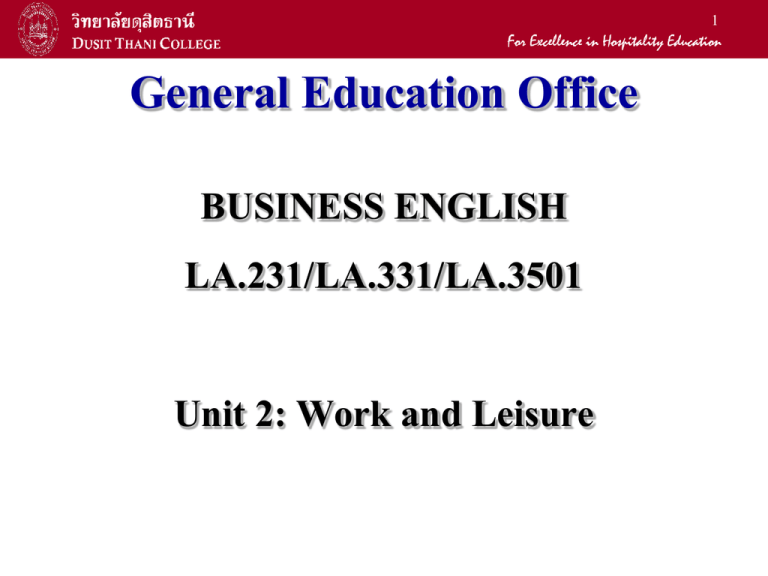
1 General Education Office BUSINESS ENGLISH LA.231/LA.331/LA.3501 Unit 2: Work and Leisure 2 Objectives By the end of this class you should be able to… 1. List basic work and leisure activities. 2. Use days, months, and dates vocabulary effectively. 3. Describe routines and use time management vocabulary 4. List work or career and lifestyle expectations. 3 Unit 2. Balancing Working and Living In the past, getting one job for your whole life was the dream. But nowadays the idea of keeping only one job is not realistic. These days it is more popular to work for short-term contracts instead of yearly contract renewals. In the past, knowing your schedule all the time allowed for people to plan leisure activities easily. In the modern world these activities are more difficult to plan for, so knowing how to do this effectively is important for a long career. 4 Technology Technology makes our jobs faster and easier to do, but this also means we now have more work to do. E-mail, laptops, and mobile phones have doubled our work and give our employers the chance to contact us anywhere and anytime. Most workers using these technologies in their jobs will work their normal hours, and take their equipment home to do more work. This saves the company time and money, and makes you work harder . 5 Flexibility Nowadays more and more people are trying to balance their worklife and their homelife more efficiently. Working part-time jobs or negotiating more flexible working hours is becoming increasingly more popular. What are some other forms of flexibility and jobs? Teleworking, or homeworking, is becoming popular, as are people who choose to “downshift” – take less demanding, and less paying jobs – in order to avoid a negative lifestyle. 6 Aspects of a good job A) Work in pairs. Discuss the things people might want from work, For example, a large office, nice colleagues B) Work in pairs. Make three word partnerships in each box to find out what four people want from their work. 1 high long helpful colleagues salary holidays 2 friendly travel job security opportunities boss 3 company mobile parking phone facilities car 4 fast flexible sports facilities promotion hours C) Now listen and check the word partnership they use. (16) 7 Aspects of a good job A) Match some word partnerships from Exercise B to their meaning 1 to 6 1) A lot of money high salary 2) A lot of time away from work 3) Good people to work with 4) The chance to go to different places on business 5) Move quickly to a higher position at work 6) You can change the times when you start and finish work 8 Prepositions of Time We use: •at for a PRECISE TIME •in for MONTHS, YEARS, CENTURIES and LONG PERIODS •on for DAYS and DATES at in on PRECISE TIME MONTHS, YEARS, CENTURIES and LONG PERIODS DAYS and DATES at 3 o'clock in May on Sunday at 10.30am in summer on Tuesdays at noon in the summer on 6 March at dinnertime in 1990 on 25 Dec. 2010 at bedtime in the 1990s on Christmas Day at sunrise in the next century on Independence Day at sunset in the Ice Age on my birthday at the moment in the past/future on New Year's Eve 9 Prepositions of Time A) Complete these time phrases with in, at or on. Then write the phrases under the correct preposition. 1 2 3 _at_ night 4 ____ the autumn 5 ____ 15th May 6 at (x3) ____ Thursday ____ the afternoon ____ Tuesday evening in (x3) at night on (x3) 7 ____ June 8 ____ New Year 9 ____ the weekend 10 Prepositions of Time B) Complete these sentences with in, at or on. 1) We have a lot of big orders _________ March. 2) The office closes for three days ________ New Year. 3) There is an important meeting _______ 15th June. 4) The CEO visits our branch ______ the summer. 5) We deliver large goods ____ Monday afternoons. 11 Describing your routine A) Before you read the article. Discuss these questions. 1) What is a typical day in the life of the CEO of a big company? 2) What do CEOs do at weekends? B) Look through the article Carlos Ghosn, Superstar, on Page 16. Can you find any of the ideas that you discussed in A.? C) Answer these questions. 1) Why do some people call Ghosn ‘7/11’? 2) Why is Ghosn’s schedule busy? D) Decide whether these statements are true or false? 1) Many people think Ghosn is Japanese. False 2) Ghosn speaks three foreign languages. 3) He lives in Europe. 4) He often travels between Europe and Asia. 5) He meets international customers at weekends. 6) He has four children. 12 Describing your routine E) In each box, match the words that go together. 1 2 3 football business car a) leader b) maker c) player 4 5 6 7 attend meet spend speak a) customers b) languages c) meetings d) time F) Work in pairs. Tell your partner about your day and about your weekend. I get up……… I arrive at work/college at….. At weekends, I….. 13 Describing your routine Language Focus We use the present simple tense to talk about habits and work routines. I travel overseas. He attends meetings. Does he meet international customers? Yes he does. / No he doesn’t. We don’t drive to work. A) Complete the article about Giorgio Armani’s working day. Use the verbs in the box. B) Complete the information about Masami Kimura. Use the correct form of the verbs in brackets. 14 Leisure Activities A) Match the leisure activities to the pictures. c a b d 1 running 2 walking 3 biking 4 swimming 15 Leisure Activities B) Use words from the box to complete the leisure activities below. going to 1 2 3 4 playing golf _______ TV _______ restaurants _______ CDs playing watching 5 6 7 8 clistening to __________ __________ __________ __________ tennis the cinema football the gym C) Talk about leisure activities. Use the verbs in the box 1 and the time phrases in box 2. e.g., I love running at the weekend. 1 love like quite like don’t like 2 at the weekend on Friday night in the summer / winter in August / December in the morning / afternoon / evening 16 Leisure Activities Language Focus – Adverbs and expressions of Frequency • We use adverbs of frequency and expressions of frequency with the present simple to say how often we do things.c He often arrives at the office at 7 o’clock. He sometimes finishes at 11pm. How often does he get up early? He always gets up early. • Adverbs of frequency often go: - before the main verb: Karla sometimes works from home. - after the verb to be: I am always at work before 9.00am. never 0% • sometimes often usually always 100% Expressions of frequency go at the beginning or the end of a sentence. Two nights a week, he works late at the office. He works from home once a month. 17 Adverbs of Frequency a) Write the words in brackets in the correct places in these sentences. usually 1) She gets up early. (usually) 2) They start their meeting at 9 o’clock. (always) 3) We are late for meetings. (never) 4) I am busy in the afternoon. (often) 5) The office closes at 3pm. (sometimes) b) Complete the expressions of frequency below. Use words from the box. three then twice Sunday week time 1 from time to time 3 once a _______ 5 every _________ 2 now and _______ 4 6 _____ times a week ________ a month 18 Adverbs of Frequency d) An interviewer asks people from different countries about their typical day. Listen and complete this chart. (17) Rodolfo (Mexican) 1 What do you do when you get to work? Isabel (Swiss) Sigrid (Austrian) check email 2 Where do you have lunch? 3 How often do you travel on business? f) Work in pairs. Ask and answer these questions. Add similar ones of your own. How often do you…. 1 2 3 4 play sports? use a mobile phone? drive to work / college? go to a gym / fitness centre? 5 6 7 8 entertain at home? go on business trips? go abroad on holiday? buy a newspaper? 19 Summary Now you can: 1. List basic work and leisure activities. 2. Use days, months, and dates vocabulary effectively. 3. Describe routines and use time management vocabulary. 4. List work or career and lifestyle expectations.

